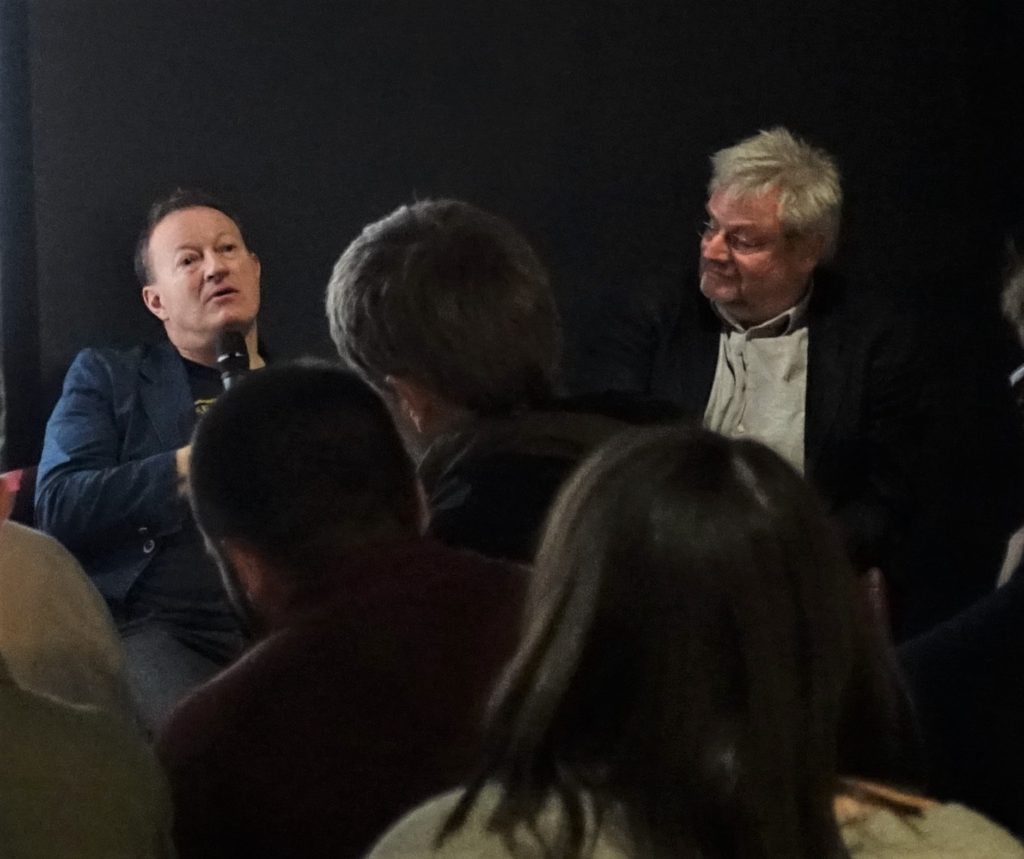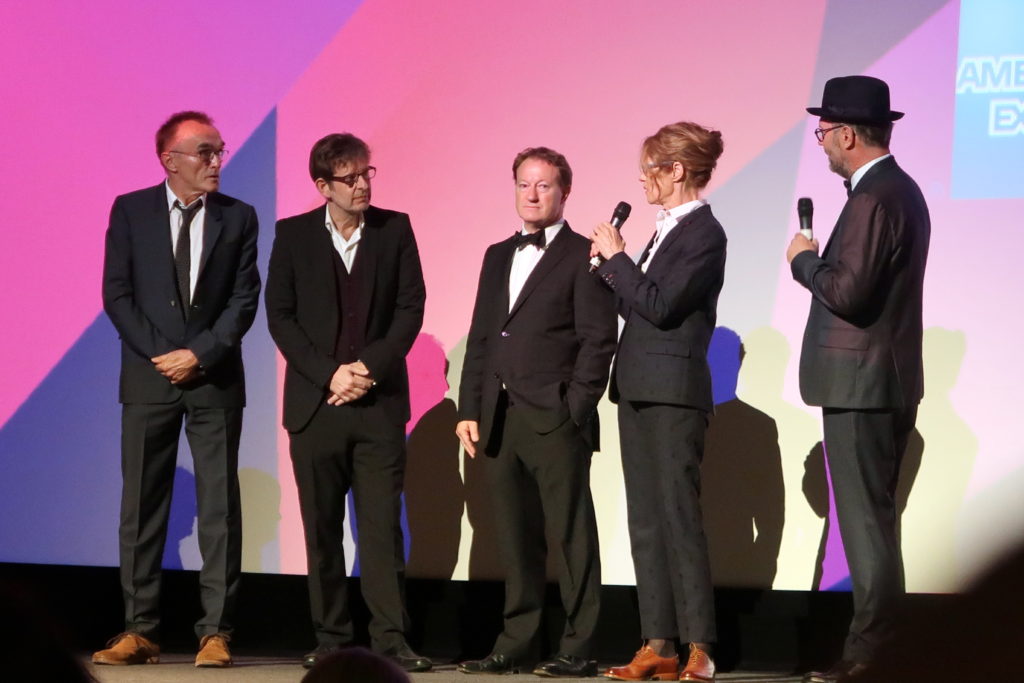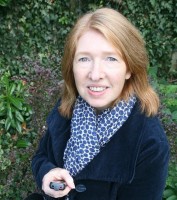Simon Beaufoy, far right, with Carl Schoenfeld and audience member Chloe Britten. Pic: Karen David
Keep your ears open if you want to write a film script, says Oscar-winning screenwriter Simon Beaufoy
Listening is the most crucial skill for a screenwriter, according to The Full Monty writer Simon Beaufoy.
To illustrate this, the scriptwriter of multi-Oscar winning Slumdog Millionaire, Golden Globe-nominated Salmon Fishing in the Yemen and Battle of the Sexes, told the audience at a ScreenTalk Oxfordshire event about a recent incident.
He was in an Oxford café with a famous musician who was relating “amazing stories” about international rock stars – “the sort of anecdotes that would have been all over Twitter in two seconds”.
The irony was that although the place was packed, none of the other customers overhead a word because most were wearing headphones.
In fact, he spent two years at Bournemouth Film School learning to direct documentaries. And although one was picked up by BBC2’s 40 Minutes series, he realised documentary making wasn’t for him.
“People never say what you want them to say. Off-camera, they come out with all these amazing things. Then you switch on the camera and they say something dull, which is really frustrating,” he explained.
After a while, he decided to write down what he wanted them to say, because that seemed more interesting. But despite the shift from fact to fiction, he’s never lost the documentary maker’s sense of place and people.
“When I start a project, I go to the location and spend a lot of time hanging around drinking cups of tea and keeping my ears open, because you learn so much from listening to what’s around you,” he pointed out.
“The most useful thing I learned from documentary making is to go to a place and say: ‘If I give you a camera, what would you film?’ Suddenly, people are alive with the possibilities.”
This technique paid off big time when he went to India, as part of his preparation for writing Slumdog Millionaire.
“It was amazing because they said: ‘That’s easy. There are gangsters up there, and they’re taking over the slums’. Suddenly, all these stories were coming at me. It’s the simplest and best question to ask.”
Beaufoy’s writing is character, rather than plot-driven: “For me, the plot comes secondary to fascinating characters. I’m very interested in how stories come out of character,” he said but stressed there aren’t any rights or wrongs, and neither way is better or worse than the other.
“Fascinating characters in dilemmas, that’s where I start, because if you’ve got a really interesting person who has a problem, you’ve got a story. And it grows out of them and their conflict,” he added.
The Full Monty’s dark humour was key to the film’s enormous success – costing less than £3m to make, it went on to rack up more than £200m at the box office.

Simon Beaufoy, left, in conversation with Carl Schoenfeld. Pic: Karen David
Beaufoy’s ability to capture this pithy, yet warm, humour stems from his upbringing. He spent the first 19 years of his life in Yorkshire, growing up during the Thatcher era, which was “really grim” thanks to the demise of the northern steel plants and coal mines, which left many in desperate straits.
“The worse things got, the funnier the jokes, which I thought was a really interesting coping mechanism,” he recalled.
“Comedy’s hugely undervalued, because it sits absolutely parallel to tragedy. You get a very subtle type of comedy, where people are underplaying the drama by making jokes about it. You have pathos and humour working side by side and that, to me, is a lovely note to hit.”
A key experience which shaped Beaufoy’s writing is the three months he spent working in a second-hand machine tools factory. The massive drills and turning machines were shipped to a warehouse, where it was his job to clean them.
“We sat in a haze of paraffin, washing down machines and in my lunch breaks, I heard some of the most extraordinary and funny conversations, and the cadence and rhythm of people and how they talk and the humour was there,” he recalled.
The essence of this was translated onto the big screen in The Full Monty, where we see men who’ve lost their jobs using jokes to disguise their emotions.
“It’s a refusal to acknowledge weakness or defeat. All the things men, particularly in The Full Monty, are so bad at, they have to encode everything in humour and a dry approach to life,” he said.
Not only does Beaufoy eavesdrop on the locals when scoping out a setting for a screenplay, he also ‘listens’ to the fictional characters he’s created.
“You have to keep your ears open, which is a funny thing to say about imaginary people,” he acknowledged.
“You create a repertory company of characters and you have to get them from the beginning to the middle, to the end.
“If the plot’s taking control, it’s: ‘We need a car chase here’. But my character can’t drive. So, that’s interesting, how can they get away? Immediately, character is driving the film forward. That’s me listening to the voice of my characters. That’s the process of writing – listening to the people you’ve created do their thing.”
It’s not generally understood how collaborative it is when screenwriting, Beaufoy pointed out.
“It’s a constantly evolving process. You write a script, do various drafts, a director gets on board and it evolves again. You cast it and the actors take it in a different direction, an editor comes on board and again, it starts shape-shifting and evolving. Then you put music on it and it’s different again. And then you say: ‘It must be finished now, it’s got the music on it,’ and the marketing people turn up with a poster and you say: ‘Oh, it’s a comedy!’”
The original poster for Slumdog Millionaire was dark and saw lead actress Freida Pinto running at night, conveying a thriller atmosphere. By the time it reached Britain, it had morphed into a white background sprinkled with sparkles and showed Pinto and co-star Dev Patel embracing joyfully.
“It moved from a thriller to a comedy, which is really extraordinary when you think it’s full of small children having their eyes gouged out,” Beaufoy pointed out wryly.
“That’s what I’ve always found the most difficult part of screenwriting – allowing it to evolve without losing control of what you want it to be,” he added.
The Full Monty also switched genre – moving from “a political film with some jokes” to “a comedy with some politics”.
“It’s the film that tells you where it’s going. You can force it back to what you want it to be, but it’s a very unwise thing to do,” Beaufoy said.
The film was heavily re-cut and re-edited, pushing in with close-ups when there was a joke, leaving a pause to encourage the audience to laugh and adding jaunty music.
“It was much better and the wisest thing we all did was let it be a comedy, instead of fighting it,” he added.
He emphasised the importance of a film editor’s role: “They’re writers, too. They write with the film they’re given, rather than with a script.”

Simon Beaufoy, centre, at the 2017 London Film Festival. Pic: Bex Walton/Creative commons
Beaufoy not only wrote but also co-directed Battle of the Sexes, the story of champion tennis player Billie Jean King’s fight for equality. “It’s a completely different place in your head that you need as a director,” he said. “Every day there’s a problem on a film set. Film-making consists of a constant stream of decision-making – up to 500 questions a day, all of which need to be answered immediately and ranging from should an actress’s hair be worn up or down for a scene, should the lipstick be this colour or that colour?
“The writer in me says: ‘That’s such an interesting question. Can I tell you tomorrow?’ No, because they’re shooting in 10 minutes.”
Since the filmmaking process takes on average three-to-four years, teamwork is not just a bonus – it’s a necessity.
“Everyone has to face in the same direction,” he said. “The films that have worked best tend to be when I’ve started with the producer and director and we’ve all asked: ‘What do we want this film to do, and be?’ It often turns out to be completely different from intention, but we all went with it in lockstep.
“I’m always amazed when things go right because there are so many things to go wrong, so much money involved, so many elements that could throw it off, so when a film’s good it’s something of a miracle.”
Quizzed on how much of his own emotions he pours into his work, Beaufoy replied: “Writing is a very weird business. You’re nearly always writing about yourself, no matter how tangential.
“I find it a very difficult process. If I feel moved by what I’m writing, I feel I’m doing the right thing and the film’s on course. But you can’t have the light without the dark and vice versa, so all those emotional shades and shifts are necessary, and they all come from a very personal place.”
He added: “It’s so inextricably linked to who you are as a human. That’s where the best writing comes from, and that’s where the pain of it comes from.”
When writing, he always focuses on universal emotions. As an example, he pointed out that the Battle of the Sexes isn’t a film about tennis, it’s about unfairness and injustice, an emotion that audiences everywhere can identify with.
At The Full Monty’s screening in the US, audiences said for the first 20 minutes they couldn’t understand what the characters on screen were saying. But although they may have struggled with the colloquialisms, “they absolutely understood that lack of pride, the sense of having your life taken away from you by other people, and the love of a father for his son”.
Talking about the film 127 Hours, he reminded the audience that although on the surface it’s about a mountain climber trapped in a canyon who has to take drastic action to survive, he pointed out: “It’s about the universals of all our lives, when we become obsessive and focused on something other than the important people in our lives.
“It’s not because you’re really interested about climbing Everest, or playing tennis, we’re all interested in the human condition. It’s really cathartic to watch stories of how other people dealt with problems we’ve dealt with or are dealing with.”

Networking for film professionals and enthusiasts. Pic: ScreenTalk Oxon
His latest projects include an adaptation of Michael Ondaatje’s book In the Skin of a Lion and A Special Relationship, starring Rachel Weisz as Elizabeth Taylor in her post-Richard Burton years when she was fundraising for AIDS research.
Asked about setbacks he encountered in the early years of his career, he replied: “They don’t stop.” And he likened the process of filmmaking to Las Vegas gambling.
“It’s all on the opening weekend,” he pointed out. “It’s like going down the casino and putting all your money on red.”
Career highs include being at the back of a cinema, watching test-screening audiences laugh at his jokes. Conversely, he’s sat at the back and seen them laugh at bits that weren’t jokes.
“That’s a huge low,” he said. “You just have to roll with the punches.”
As for writer’s block, he revealed his technique for dealing with it is to “leap over the problem”.
If he becomes stuck on a scene, he skips it and writes another section of the script, or even switches to another project.
“It’s a way of keeping momentum, which is really important. Never stop, just write something different.
“It’s dangerous territory, because you start over-thinking everything, and then nothing works. Just move on,” he added.
Finally, thinking back to his experience in that Oxford café, he offered a piece of crucial advice for upcoming screenwriters.
“I was amazed sitting there, to realise all those people around us were missing the most extraordinary anecdotes, told so beautifully,” he reflected.
“Every one of them was a movie in miniature. So, my advice is simple – take off your headphones.”
The next ScreenTalk Oxfordshire event, which focuses on animation, is on May 27. More information can be found here
